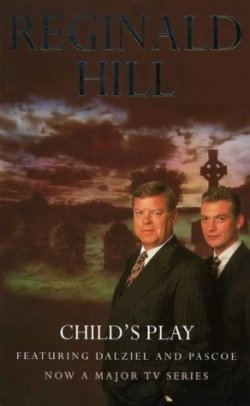 Geraldine Lomas is dead. She lived to a grand old age and has a number of potential heirs – except she has left almost all of her money to three charities – a services benevolent fund, an animal charity and a fascist organisation. The money will be in trust for twenty five years, though, as she has stipulated one condition – that the money will only go to the organisations if Geraldine’s son, lost in action during the second World War in Italy, does not return from the dead. And at the funeral, a stranger appears from nowhere and collapses at the graveside with a single word – “Mama!”
Geraldine Lomas is dead. She lived to a grand old age and has a number of potential heirs – except she has left almost all of her money to three charities – a services benevolent fund, an animal charity and a fascist organisation. The money will be in trust for twenty five years, though, as she has stipulated one condition – that the money will only go to the organisations if Geraldine’s son, lost in action during the second World War in Italy, does not return from the dead. And at the funeral, a stranger appears from nowhere and collapses at the graveside with a single word – “Mama!”
Detective Superintendent Dalziel has enough on his plate as it is – there’s a new Chief Constable in the offing and he’s determined to make some money on the illegal book being run on it. But when Sergeant Wield’s personal affairs threaten the department and a dead Italian turns up in the police car park, he and DI Pascoe are going to do well to find the truth this time.
I’ve managed to do two books this month in Past Offences’ Crimes Of The Century meme this month – 1987 is later than we normally look at, but it gave me a chance to return to the Dalziel and Pascoe series from Reginald Hill, a series that I read a fair bit of pre-blog but not at all in recent years. My general feeling of the series is that they are mostly very well plotted and very well written police procedural mysteries (although I didn’t like Deadheads) but as the series progressed, the character became more important and the plot less so – Death’s Jest Book sticks in the memory are being very unsatisfactory. But when the series was good (which was most of the time), it was outstanding – Dialogues of the Dead and Exit Lines stick in the mind, as does the audacious clue in A Killing Kindness. But even though I’ve read most of them, I can’t remember much about them – in fact, I could barely remember this one at all.
Odd that, given that it’s a fantastic read. The multiple mysteries dovetail nicely with only one (massive) coincidence needed to tie it all together. The killer is very well hidden and there’s an additional (and actually very funny) surprise at the end of the tale.
But it’s Hill’s writing and characterisation that make the book shine. The books tended to oscillate their focus from one lead to the other and Dalziel gets a lot of the spotlight here, as does Wield. A fair part of the non-mystery plot comes from the revelation (I don’t recall if it is stated overtly in an earlier book) of Wield’s homosexuality and the effect that it would have on his career (this is 1980s Yorkshire) as a policeman if it were made public. Hill isn’t blind to the fact that some people would see it as a massive issue, but Andy Dalziel’s reaction to it is what makes the book. It’s rather wonderful.
Anyway, I guess this is another series to revisit – it might be interesting to see what I think of some of the books with older, wiser eyes. This entry in the series is a perfect standalone though and is Highly Recommended.

It’s been too long since I read Hill and I’ve never read this one – sounds great, thanks chum, must pick some of his up again.
LikeLike
Excellent – I’ll keep an eye out for your reviews.
LikeLike
I read several when the TV show was on and went back to him a little when he died but I do wanted to make more of an effort as there are plenty I clearly haven’t read – I just hate missing out on a good thing 🙂
LikeLike
The early ones are the best – I think. The last few might be great but I’ve not got to them yet.
LikeLike
I think the earliest I have on my TBR is AN ADVANCEMENT OF LEARNING, though I also want to tackle the standalone THE SPY’S WIFE which had some great reviews.
LikeLike
Sergeant Wield first appears in the fifth book A Pinch Of Snuff. His homosexuality is explicitly mentioned in the next book A Killing Kindness.
LikeLike
[…] Child’s Play by Reginald Hill […]
LikeLike
[…] Doctor also read Reginald Hill’s Child’s Play, […]
LikeLike
[…] not as strong as Child’s Play on re-reading it, but if you haven’t read it before, it’s Highly […]
LikeLike
[…] Child’s Play by Reginald Hill […]
LikeLike
[…] especially when its been a recent year, has been Reginald Hill, with A Killing Kindness and Child’s Play. So when 1976 reared its head, I figured, why not go back to Dalziel and Pascoe for this […]
LikeLike